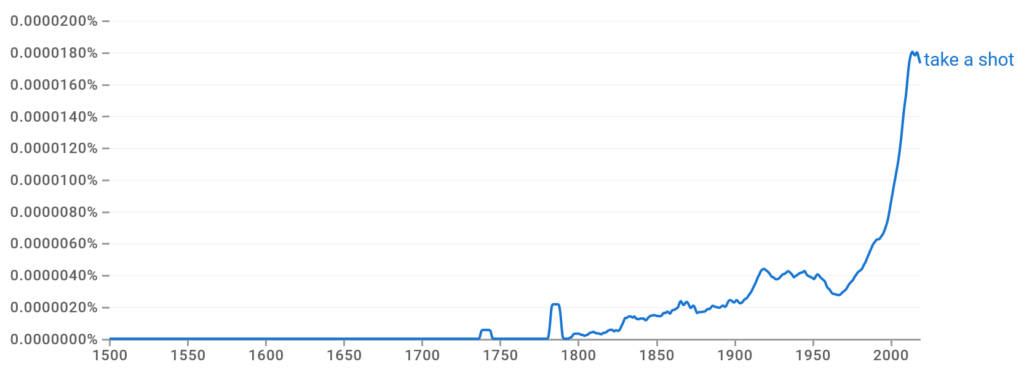Take a shot means to try or attempt something, often with the hope of success. This idiom signifies giving something a try to see if it works or if you can do it. However, this idiom holds various interpretations, explored in detail below.
Idioms such as take a shot are expressions that have a meaning different from the literal interpretation of the words used. Understanding idioms is crucial for mastering English as it enriches your language skills, enabling more effective and nuanced communication.
This article explores the various interpretations of the phrase take a shot, elucidates its contextual usage, and reveals its origins. Additionally, it offers valuable tips for effective application, along with illustrative examples and related terms. Dive in to grasp the versatility of take a shot and enhance your verbal and written communication skills.
What Does the Idiom Take a Shot Mean?
Take a shot is a phrase that is still used literally to mean to shoot at something with a firearm.
However, the term may also be used figuratively to mean:
- To make an attempt or to try something
- To attempt to score while playing a sport
- To make a derogatory remark about someone or insult that person
- To take a photograph
- To quickly drink a small amount of hard liquor out of a small glass
It’s most often used as an idiomatic expression to indicate support to try something and is commonly seen in casual conversation.
For example, when my son let me know he would try out for the high school golf team, I was surprised because he had only taken a few lessons when he was younger. However, I told him to go ahead and take a shot at it and see where it went. Surprisingly, he made the team and is now one of the best the school has.
Merriam-Webster lists the following definitions as well:
- To fire a gun
- To try to hit
- To propel a ball or puck toward a goal
- To make a critical or hurtful remark about someone
- To attempt to do something successfully
- To photograph something
How Is Take a Shot Commonly Used in Context?
Context is essential when using an idiom, especially when it has multiple definitions. Pay particular attention to the different ways take a shot can be used in speech and writing.
What Are the Different Ways to Use Take a Shot?
The phrase take a shot can be used in various contexts to convey different meanings:
- Literal meaning: The phrase can be used to suggest taking a physical shot of a drink, such as alcohol. For example, “Let’s celebrate! Take a birthday shot!”
- Trying something new: It can be used to encourage someone to try something they haven’t done before. For example, “You’ve never played tennis? Go ahead, take a shot at it!”
- Attempting a challenge: It can be used to encourage someone to take on a difficult task or challenge. For example, “I know it’s a tough problem, but why not take a shot at solving it?”
- Risk-taking: It can suggest taking a risk or pursuing an opportunity with uncertain outcomes. For example, “The new business venture seems promising. Should we take a shot and invest in it?”
- Making a guess: It can be used to make an educated guess or estimate. For example, “What’s your answer to the riddle? Take a shot, even if you’re not sure.”
- Seizing an opportunity: It can be used to prompt someone to seize a favorable opportunity. For example, “The job opening is perfect for you. Take a shot and apply!”
- Sporting context: In sports, it can refer to taking a shot at scoring a goal or making an attempt to win. For example, “The striker took a shot at the goal, but the goalkeeper saved it.”
Where Can You Find Examples of Take a Shot?
Examples of the phrase take a shot can be found in various sources, including:
- Movies
- Athletics
- Songs
- Everyday conversations
When looking for online sources, you’ll most often find the expression in sports columns either in the context of a shot on a goal or opportunity or in reference to an insult:
Burrow probably didn’t mean to take a shot at Cincinnati, he is an Ohio native after all. (Sports Illustrated)
The Chicago Bears had to take a shot at a QB—and they did, moving up to draft Justin Fields on what could prove to be a pivotal day in the NFC North. (Chicago Tribune)
What Are Some Tips for Using Take a Shot Effectively?
The idiom take a shot is almost exclusively used in casual speech and dialog. So, here are some tips for using it effectively:
- Understand the meaning: Familiarize yourself with the various meanings of the idiom. It can refer to trying something new, taking a risk, attempting a challenge, or making a guess.
- Assess receptiveness: Some individuals may be more inclined to embrace opportunities, while others may be more cautious.
- Encouragement and support: The idiom should inspire confidence and motivate action.
- Tone and delivery: Be enthusiastic and sincere, conveying your belief in the person’s abilities and potential.
What Is the Origin of the Idiom Take a Shot?
The idiom take a shot comes from the literal meaning, which is to attempt to shoot at something. The figurative meanings of take a shot have been in use for some time; exactly when and how these expressions came into use is foggy.
However, rumor has it that you could trade a bullet for a shot of alcohol in the American Wild West, but this is an unproven origin without proof to support it. To take a shot of alcohol is likely the first use of the expression and may be the origin of the idiom.
The word shot was defined as “a measure of alcohol” in the Reverend Oliver Haywood’s autobiography. He lived between the years of 1629-1702.
Another theory attributes the use of the word shot, as in shot glass, to Friedrich Otto Schott, a glassmaker in America who made small liquor glasses. By 1756, shot was used in a broad manner to mean to try or an attempt.
How Did the Idiom Evolve Over Time?
Over time, the expression has evolved into various meanings and is well recognized in a variety of different scenarios.
What Are Some Related Terms to Take a Shot?
Since take a shot has multiple meanings, I offer synonyms corresponding to its various interpretations.
Synonyms
Synonyms for take a shot, meaning attempting, trying, or taking a risk:
- Give it a try
- Have a go
- Take a stab
- Make an attempt
- Take a chance
Synonyms for take a shot, meaning taking a photograph:
- Capture an image
- Snap a photo
- Shoot a picture
- Take a photograph
- Create a snapshot
Synonyms for take a shot, meaning insult or verbal assault:
- Hurl an insult
- Throw a barb
- Make a derogatory comment
- Deliver a cutting remark
- Launch an attack
- Fire off an offensive statement
Antonyms
Antonyms implying the opposite of taking action or making an attempt:
- Avoid
- Decline
- Refrain
- Pass up
- Miss out
- Shun
Antonyms for insult or verbal assault:
- Show respect
- Offer praise
- Give compliments
- Express kindness
- Speak positively
- Display empathy
Take a Shot: Test Your Knowledge!
Choose the correct answer.
What Have We Learned about Take a Shot?
The idiom take a shot embodies various meanings, urging individuals to seize new opportunities, conquer obstacles, and chase their aspirations. While its most common usage encourages action and risk-taking, take a shot can also refer to consuming alcohol, aiming a ball or puck at a target, delivering a crucial comment, or capturing a photograph.
Because of this, it is important that you incorporate the proper context so that your listeners understand your use of the expression.
This article defined each of the many ways you can use the expression, focusing on its most popular figurative use in speech and writing: to take on something new or challenging. By now, you can confidently use the idiom in your own speech and writing like a pro.
Keep exploring Grammarist to discover the meaning behind many other idioms and elevate your English language skills.
Enjoyed reading about this idiom? Check out some others we covered:



